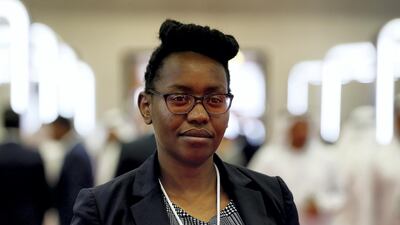Zimbabwe is opening its doors to UAE investors as it aims to build up its infrastructure under the new government regime.
"Zimbabwe is going through transition ... we have a new president who is ready to go an extra mile when it comes to attracting UAE investors," Meluleki Sibanda, a legal advisor to One Stop Investment Services Centre of the Zimbabwean government, told The National.
“From tax cuts to duty-free import of capital equipment to cheaper land, water and electricity, Zimbabwe offers an array of incentives to foreign companies and investors,” said Ms Sibanda, who was part of Zimbabwe's delegation at Sharjah FDI Forum 2018..
Last year, the African country registered a trade surplus with the UAE. Exports to the Emirates were worth $366.8 million, while imports from the UAE were valued at $59.2m, representing a surplus for the African country of $307.6m.
Zimbabwe is inviting UAE companies to invest in sectors such as mining, information and communications technology (ICT), agriculture, tourism, entertainment, education, health, clean energy and construction.
“We want to collaborate with the UAE not only for the exploitation of our mineral resources but for the value addition of the overall mining industry that has the potential to create new employment opportunities,” said Ms Sibanda.
Zimbabwe’s exports to the UAE are underpinned by the mineral resources – precious metals, including gold and diamonds – that the southern African country holds in abundance. It has more than 13 million tonnes of proven gold reserves, of which only 580 tonnes have been exploited since 1980, according to the Reserve Bank of Zimbabwe.
“Our literacy rate is over 90 per cent – the highest in Africa – and the majority of our population is tech-savvy. We are aiming to lead the African continent in the ICT sector and are looking forward to UAE tech companies setting up bases here. We are creating special economic zones for this purpose," Ms Sibanda said.
_______________
Read more:
South Africa out of recession but hard times remain
Stalled by a flooded market Chinese automakers pursue Africa ambitions
_______________
"We have seen a keen interest from UAE investors in the past few months and we are expecting a further uptick with the opening of Emirates embassy,” she said, adding, “One UAE company has already invested in setting up a motorsports [racing circuit], on the lines of Formula One, in the Victoria Falls region.”
This month, the UAE issued a decree to establish its embassy in Harare, Zimbabwe's capital. The two nations also signed a bilateral investment promotion and protection agreement in June this year to safeguard the interests of investors.
One Stop Investment Services Centre, which was established in July 2018, is a precursor to the planned Zimbabwe Investment and Development Agency.
“Right now we are framing the legal framework and it will be fully operational by the first quarter of 2019. Our government realised that there was a lot of bureaucracy hindering foreign investments so it decided to come up with an integrated body.”
All government departments come under domain of One Stop Investment Services Centre and this is the single-window contact for potential investors.
After a military coup in November 2017 - leading to the installation of Emmerson Mnangagwa as the country’s third president - Zimbabwe is still struggling with a currency crisis. The country does not have its own currency after suffering hyperinflation. However, Ms Sibanda denied the country was suffering a currency problem and said the current foreign currency shortages were being addressed by various measures.
“There is no currency crisis in Zimbabwe as we have a multi-currency system. We use the US dollar as the anchor currency and it gives investors a competitive advantage. Also, there is a provision of 100 per cent repatriation of funds,” she said.
Zimbabwe is aiming to have an open market economy under the new leadership that has already made many changes in the legal framework – addressing corruption and minimising the cost of doing business.


